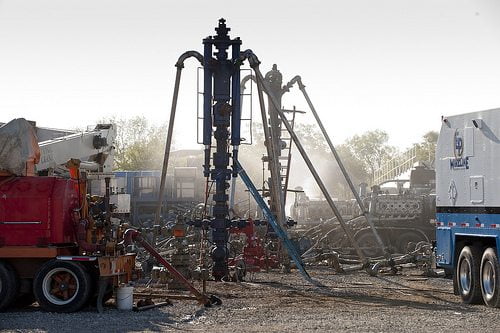

Energy
Survey: public support for fracking weakening
A series of surveys tracking the awareness of and support for shale gas shows that public backing for the industry has slipped following several protests and concerns around water contamination.
The University of Nottingham asked over 3,000 members of the public for their opinion on shale gas between January 22-24, marking the eighth survey to be carried out by researchers. Public support for fracking had been steadily increasing, with 39% of participants saying fracking should be allowed in the UK in July 2013. However, this fell back to 26% this month.
Sarah O’Hara, a professor of geography at the University of Nottingham and one of the lead researchers in the study, said, “The January survey confirms that after a prolonged period where the UK public appeared to be warming to shale gas the opinion is now shifting in the opposite direction.”
Whilst some respondents still see shale gas as a cheap form of fuel this view has also declined. In July 2013, 33% of the public were of this opinion but over the last six months this has receded to 22%. O’Hara added this may represent an “increasing sense of unease with the environmental implications” of fracking techniques.
Many protests have highlighted the possibility of water contamination and this concern was also reflected in the survey results.
The findings come as environment secretary Owen Paterson admitted that ministers have “failed to convince” the public of the benefits of fracking. Instead he said the government has lost support to campaigners.
Sustainable fund management business Alliance Trust recently reviewed its position on unconventional gas following client concerns about the uncertain environmental impact of the industry. The firm said questions around the amount of fugitive emissions released during operations affected the decision, adding that it was not comfortable that operations were currently of the “highest standards”.
On Monday, a Cambridge academic argued that shale gas companies should pay for the carbon dioxide and methane emissions that derive from fracking. Chris Hope said if his proposals were adopted, the taxes could generate around £6 billion by the mid-2020s.
The University of Nottingham study also asked the public what they thought of the proposal that energy companies pay a ‘community benefits’ charge to local communities where fracking takes place. The majority of people thought the payments would be to get support for fracking in the area rather than bringing benefit to the communities. This suggests the payments are seen as a means of “buying off” potential opposition, according to the researchers.
Matthew Humphrey, from the school of political and international relations and co-author of the report, said, “These figures may reflect the increasing pollicisation of fracking and shale gas as a contentious issue in UK public policy.
“The public is getting strong messages from protest groups about the dangers of fracking and an equally strong message from the government about the benefits it will bring in terms of secure and affordable energy.”
He concluded, “The trends seem to show that neither side has won the argument yet.”
Further reading:
Make fracking firms pay for emissions, says Cambridge academic
Davos: David Cameron ‘undermining climate change efforts’ with fracking support
Cuadrilla abandons fracking plans in Balcombe
EU ‘bows to pressure from fossil fuel lobby’ as fracking regulation plans are shelved
Total needs to be given ‘clean bill of health’ before fracking, say campaigners






























